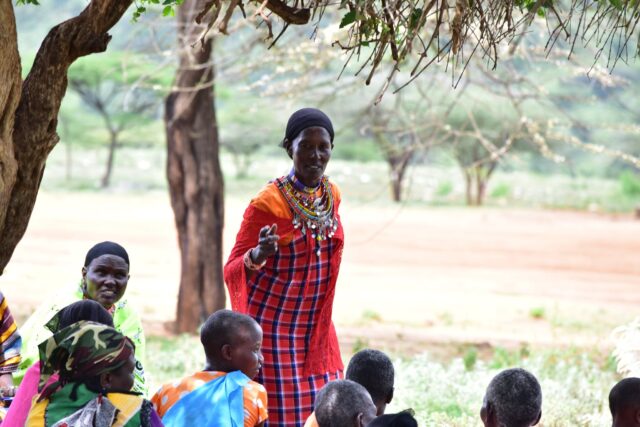
Sheikh Mohammed Wario listens keenly as fellow villagers take turns to converse about a topic that for long has gone unspoken yet many girls continue to wallow in pain as their right to choice and dignity is taken away.
As the dialogues proceeds, he takes turn to speak out his mind- “ we must tell ourselves the truth that we are destroying the lives of our daughters. I believe we can all be part of the change. Our girls deserve to be in school and not married off,” says the 58-year-old father of nine.
Among the Borana community living in Kina, Isiolo County where Sheikh Wario ails from, girls as young as seven years are forced to undergo genital cutting and married off to elderly men in exchange for goats and camels. 
As a Sheikh, he has continuously refused to yield to the pressure to circumcise her three daughters aged 6, 10 and 13 as it is in the norm in many household. A few years ago, he had an opportunity to travel to India where he learnt about women rights issues and was inspired by fellow clerics who were working to protect their wives and daughters from discriminatory cultural practices.
And when he learnt about the teachings on gender based violence done by the Malka Bisanadi Cultural group, he was delighted to join in- bringing along his two wives to the various dialogues to also be enlightened.
Malka Bisanadi Cultural group, is one of the a women-led groups operating in Kina Sub-County of Isiolo, their initiatives cuts across women’s economic empowerment coupled with conversations geared towards eliminating violence against women and girls in the community.
For Wario, the ability for young girls to have a voice on matters regarding their wellbeing is key and as such he teachers young girls in his Madrasa session to be aware of their rights and to speak out on violations. Since he started participating in the community conversations with the women activists, he has taken keen interest in rallying other elderly members of the community to abandon the practice of FGM and give girls a voice over their bodily autonomy.
“As a Sheikh am aware that FGM is not part of Islam, it is just part of the culture that we must do away with,” says the Sheikh noting that Islamic values are intended to safeguard the well being of everyone in the community; women and girls included. 
With the anti-FGM campaigns gaining momentum in Kenya, religious leaders like Sheikh Wario plays a crucial role in delinking FGM from the religious aspects that promotes tolerance to the practice and mobilizing communities to lead the fight against it.
Over the last one year, CREAW adopted the use of a community dialogues in FGM in Narok and Isiolo counties which are key FGM hotspots to raise awareness among community members; clerics and council of elders included. In the dialogues, communities discusses emerging trends and the norms that are a threat to the survival of women and girls.
“I am happy when I meet with fellow men in the dialogues. It shows that they too are eager to learn and be part of the change we so desire for the future of our young girls,” he says.
As a Sheikh, he is held in high regards and his opinion is respected community members; as such, he is using his stature and voice to end the age-old practice of FGM.
